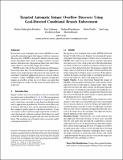Targeted Automatic Integer Overflow Discovery Using Goal-Directed Conditional Branch Enforcement
Author(s)
Sidiroglou-Douskos, Stelios; Lahtinen, Eric; Piselli, Paolo; Long, Fan; Kim, Deokhwan; Rinard, Martin C.; Rittenhouse, Nathan (Nathan W.); ... Show more Show less
DownloadRinard_Targeted automatic.pdf (359.2Kb)
OPEN_ACCESS_POLICY
Open Access Policy
Creative Commons Attribution-Noncommercial-Share Alike
Terms of use
Metadata
Show full item recordAbstract
We present a new technique and system, DIODE, for auto- matically generating inputs that trigger overflows at memory allocation sites. DIODE is designed to identify relevant sanity checks that inputs must satisfy to trigger overflows at target memory allocation sites, then generate inputs that satisfy these sanity checks to successfully trigger the overflow. DIODE works with off-the-shelf, production x86 binaries. Our results show that, for our benchmark set of applications, and for every target memory allocation site exercised by our seed inputs (which the applications process correctly with no overflows), either 1) DIODE is able to generate an input that triggers an overflow at that site or 2) there is no input that would trigger an overflow for the observed target expression at that site.
Date issued
2015-03Department
Massachusetts Institute of Technology. Computer Science and Artificial Intelligence Laboratory; Massachusetts Institute of Technology. Department of Electrical Engineering and Computer ScienceJournal
Proceedings of the Twentieth International Conference on Architectural Support for Programming Languages and Operating Systems (ASPLOS 2015)
Publisher
Association for Computing Machinery (ACM)
Citation
Sidiroglou-Douskos, Stelios et al. “Targeted Automatic Integer Overflow Discovery Using Goal-Directed Conditional Branch Enforcement.” Twentieth International Conference on Architectural Support for Programming Languages and Operating Systems (ASPLOS 2015) (March 2015): 473–486.
Version: Author's final manuscript
ISBN
9781450328357